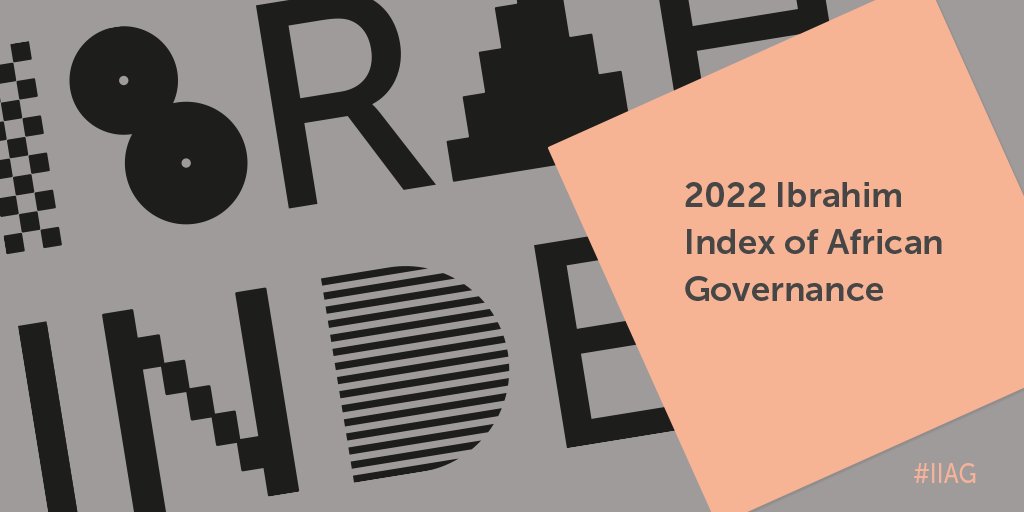Mo Ibrahim Foundation on Wednesday, January 25th, launched the 2022 Ibrahim Index of African Governance (IIAG) Report. This edition foregrounds critical matters from 2019 till 2022 that interfere in the progress of the continent such as the COVID-19 pandemic, insecurity, terrorist attacks and political agitations.
Since 2007, IIAG constitutes the most comprehensive data on governance in Africa. Every two years, across 54 African countries over a period of ten years – that is, between 2012 to 2021 – the index gives comparable information on every aspect of African government, including safety and security, rule of law, openness, rights, and participation in economic possibilities, as well as education, health, and the environment. The current data expose that African governance has not only remained static but also drastically fallen.
Mo Ibrahim, founder and chair of the Mo Ibrahim Foundation, said:
“The 2022 Ibrahim Index of African Governance highlights that African governance has flatlined since 2019. Unless we quickly address this concerning trend, the years of progress we have witnessed could be lost, and Africa unable to reach in due time the SDGs or Agenda 2063.
“Our continent is uniquely exposed to the converging impacts of climate change, more recently COVID-19, and now the indirect impact of Russia-Ukraine war. Governments must address all at once ongoing lack of prospects for our growing youth, worsening food insecurity, lack of access to energy for almost half the continent’s population, heavier debt burden, growing domestic unrest. Coups are back, and democratic backsliding spreading. These are challenging times. More than ever, commitment to strengthen governance must be renewed, unless we lose all progress achieved.
“The 2022 Ibrahim Index of African Governance highlights a stagnation of African governance since 2019, which should be a cause of concern for us all. We have come too far to let the disruptions of the last few years derail our ambitions and unless we quickly address this concerning trend, years of progress could be lost, and Africa might not be able to achieve the African Union’s Agenda 2063 or the UN Sustainable Development Goals.”
Although IIAG confirms that these worrying trends existed prior to the pandemic, it also reveals how the emergency measures and precautions put in place to deal with COVID-19 and its aftermath have made already difficult situations worse by hastening the erosion of democratic practices, suppressing dissent, constricting civic space, and avoiding democratic scrutiny.
The IIAG’s other two categories– Human Development and Foundations for Economic Opportunity – do offer cause for cautious optimism, as both have progressed over 2012-2021. This is particularly the case for Human Development, which has improved year-on-year across the decade, with more than 90% of Africa’s population living in a country where progress has been made since 2012. As to Foundations for Economic Opportunity, the level reached in 2021 is higher than in 2012, and this is the only category to have even continued to make progress since 2019, despite the seismic shocks of the pandemic, mostly due to considerable improvements in the Infrastructure sub-category.
The 2022 IIAG Report also provides insights into key remaining data gaps on governance priorities in Africa, such as employment, health, rural areas, and climate challenges, for example, the Health sub-category is still unable to include data on health structures and capacities – a critical element of the continent’s response to any pandemic- due to a lack of data. Data is essential for effective policymaking and strengthening data production and uptake in Africa remains a priority of the Mo Ibrahim Foundation.
In sum, the 2022 IIAG shows that governance progress is being hindered by diverging trajectories, as progress in Human Development and Foundations for Economic Opportunity is offset by a deterioration in both Security & Rule of Law and Participation, Rights & Inclusion, holding back Overall Governance. Unless sustained good governance is prioritised, decades of progress, and Africa’s ability to achieve the Sustainable Development Goals and Agenda 2063, will be under threat.
The data portal can be accessed to track the trends according to each country and at the continental level in English, Arabic, French, and Portuguese.
The entire 2022 Ibrahim Index of African Governance Report can be downloaded here.
The post Mo Ibrahim Foundation Launches 2022 Ibrahim Index of African Governance (IIAG) Report appeared first on BellaNaija – Showcasing Africa to the world. Read today!.
Source: BellaNaija



